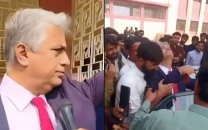Workshop: Pakistan on target to reduce HCFCs
Used as refrigerant, the chemicals deplete the ozone.

“Pakistan will perhaps be the first or second country in the region to meet the 2015 target, but we need to plan for post-2015 as well,” says Ashraf.
Pakistan is a regional leader in reducing the production of hydro chlorofluorocarbons (HCFCs) which deplete the ozone layer — but greater cooperation is needed between the industry and policymakers to phase them out.
A workshop on “Policies to Facilitate HCFCs Phase-out for Policymakers” was held on Friday brought together stakeholders to discuss ways to further reduce consumption.
HCFCs are commonly used as a refrigerant in refrigerators and air conditioners. Like chlorofluorocarbons, the chlorine atoms in HCFCs also destroy the ozone. HCFCs are also present in greenhouse gases that trap heat and lead to global warming.
Pakistan is a signatory to the 1987 Montreal Protocol on Substances that Deplete the Ozone Layer. The international protocol — signed by over 190 countries — requires its signatories to start reducing HCFCs consumption and production by 2015 and completely phase them out by 2030.

For developing countries, the 2015 target is a 10 per cent reduction in HCFCs, according to the United Nations Environment Programme (UNEP) website.
“Achieving that target is challenging,” said an industry representative, who requested anonymity. “We cannot stop our industries to save the ozone.”
He said the issue could not be resolved till policymakers included them in discussions to reduce HCFCs.
International Cooperation Joint Secretary Muhammad Ashraf, from the Ministry of Climate Change, said Pakistan was fulfilling international commitments to reduce HCFCs. “We need stakeholders’ cooperation on how to implement cost-effective ways to reduce HCFCs.”
“Pakistan will perhaps be the first or second country in the region to meet the 2015 target, but we need to plan for post-2015 as well,” he added.
Government officials requested for inclusion of changeover from HCFC in the businesses’ strategic plans. They also urged the use of insulating foam in refrigerators that contains eco-friendly blowing agents instead of HCFCs.
The workshop was organised by the Ministry of Climate Change in collaboration with UNEP.
Published in The Express Tribune, February 16th, 2013.



















COMMENTS
Comments are moderated and generally will be posted if they are on-topic and not abusive.
For more information, please see our Comments FAQ